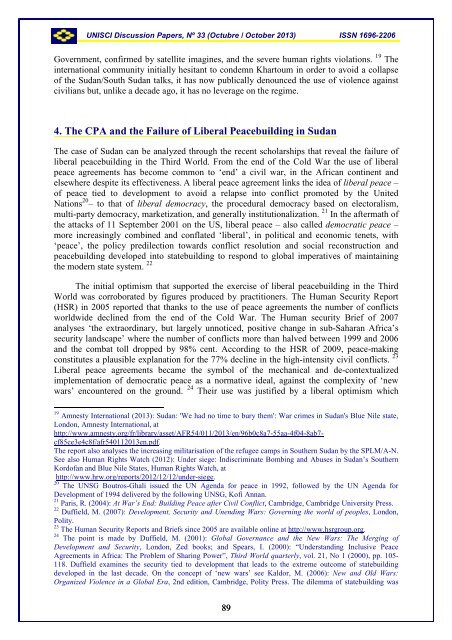UNISCI - Universidad Complutense de Madrid
UNISCI - Universidad Complutense de Madrid
UNISCI - Universidad Complutense de Madrid
Create successful ePaper yourself
Turn your PDF publications into a flip-book with our unique Google optimized e-Paper software.
<strong>UNISCI</strong> Discussion Papers, Nº 33 (Octubre / October 2013) ISSN 1696-2206Government, confirmed by satellite imagines, and the severe human rights violations. 19 Theinternational community initially hesitant to con<strong>de</strong>mn Khartoum in or<strong>de</strong>r to avoid a collapseof the Sudan/South Sudan talks, it has now publically <strong>de</strong>nounced the use of violence againstcivilians but, unlike a <strong>de</strong>ca<strong>de</strong> ago, it has no leverage on the regime.4. The CPA and the Failure of Liberal Peacebuilding in SudanThe case of Sudan can be analyzed through the recent scholarships that reveal the failure ofliberal peacebuilding in the Third World. From the end of the Cold War the use of liberalpeace agreements has become common to ‘end’ a civil war, in the African continent an<strong>de</strong>lsewhere <strong>de</strong>spite its effectiveness. A liberal peace agreement links the i<strong>de</strong>a of liberal peace –of peace tied to <strong>de</strong>velopment to avoid a relapse into conflict promoted by the UnitedNations 20 – to that of liberal <strong>de</strong>mocracy, the procedural <strong>de</strong>mocracy based on electoralism,multi-party <strong>de</strong>mocracy, marketization, and generally institutionalization. 21 In the aftermath ofthe attacks of 11 September 2001 on the US, liberal peace – also called <strong>de</strong>mocratic peace –more increasingly combined and conflated ‘liberal’, in political and economic tenets, with‘peace’, the policy predilection towards conflict resolution and social reconstruction andpeacebuilding <strong>de</strong>veloped into statebuilding to respond to global imperatives of maintainingthe mo<strong>de</strong>rn state system. 22The initial optimism that supported the exercise of liberal peacebuilding in the ThirdWorld was corroborated by figures produced by practitioners. The Human Security Report(HSR) in 2005 reported that thanks to the use of peace agreements the number of conflictsworldwi<strong>de</strong> <strong>de</strong>clined from the end of the Cold War. The Human security Brief of 2007analyses ‘the extraordinary, but largely unnoticed, positive change in sub-Saharan Africa’ssecurity landscape’ where the number of conflicts more than halved between 1999 and 2006and the combat toll dropped by 98% cent. According to the HSR of 2009, peace-makingconstitutes a plausible explanation for the 77% <strong>de</strong>cline in the high-intensity civil conflicts. 23Liberal peace agreements became the symbol of the mechanical and <strong>de</strong>-contextualizedimplementation of <strong>de</strong>mocratic peace as a normative i<strong>de</strong>al, against the complexity of ‘newwars’ encountered on the ground. 24 Their use was justified by a liberal optimism which19 Amnesty International (2013): Sudan: 'We had no time to bury them': War crimes in Sudan's Blue Nile state,London, Amnesty International, athttp://www.amnesty.org/fr/library/asset/AFR54/011/2013/en/96b0c8a7-55aa-4f04-8ab7-cf85ce3e4c8f/afr540112013en.pdf.The report also analyses the increasing militarisation of the refugee camps in Southern Sudan by the SPLM/A-N.See also Human Rights Watch (2012): Un<strong>de</strong>r siege: Indiscriminate Bombing and Abuses in Sudan’s SouthernKordofan and Blue Nile States, Human Rights Watch, athttp://www.hrw.org/reports/2012/12/12/un<strong>de</strong>r-siege.20 The UNSG Boutros-Ghali issued the UN Agenda for peace in 1992, followed by the UN Agenda forDevelopment of 1994 <strong>de</strong>livered by the following UNSG, Kofi Annan.21 Paris, R. (2004): At War’s End: Building Peace after Civil Conflict, Cambridge, Cambridge University Press.22 Duffield, M. (2007): Development, Security and Unending Wars: Governing the world of peoples, London,Polity.23 The Human Security Reports and Briefs since 2005 are available online at http://www.hsrgroup.org.24 The point is ma<strong>de</strong> by Duffield, M. (2001): Global Governance and the New Wars: The Merging ofDevelopment and Security, London, Zed books; and Spears, I. (2000): “Un<strong>de</strong>rstanding Inclusive PeaceAgreements in Africa: The Problem of Sharing Power”, Third World quarterly, vol. 21, No 1 (2000), pp. 105-118. Duffield examines the security tied to <strong>de</strong>velopment that leads to the extreme outcome of statebuilding<strong>de</strong>veloped in the last <strong>de</strong>ca<strong>de</strong>. On the concept of ‘new wars’ see Kaldor, M. (2006): New and Old Wars:Organized Violence in a Global Era, 2nd edition, Cambridge, Polity Press. The dilemma of statebuilding was89
















